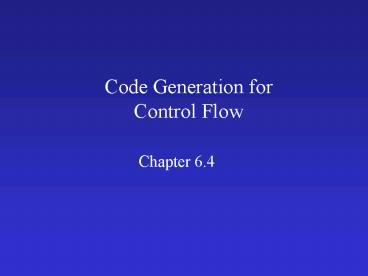Code Generation for Control Flow - PowerPoint PPT Presentation
1 / 26
Title:
Code Generation for Control Flow
Description:
Negations can be performed at compile-time. Code for a b yielding a condition value ... can be shifted to compile-time. Loop invariant. Strength reduction ... – PowerPoint PPT presentation
Number of Views:33
Avg rating:3.0/5.0
Title: Code Generation for Control Flow
1
Code Generation forControl Flow
- Chapter 6.4
2
Outline
- Local flow of control
- Conditionals
- Switch
- Loops
3
Machine Code Assumptions
4
Boolean Expressions
- In principle behave like arithmetic expressions
- But are treated specially
- Different machine instructions
- Shortcut computations
- Negations can be performed at compile-time
Code for a lt b yielding a condition value
Conversion condition value into
Boolean Conversion from Boolean in condition
value Jump to l on condition value
if (a lt b) goto l
5
Shortcut computations
- Languages such as C define shortcut computation
rules for Boolean - Incorrect translation of e1 e2 Code to
compute e1 in loc1 Code to compute e2 in loc2
Code for operator on loc1 and loc2
6
Code for Booleans(Location Computation)
- Top-Down tree traversal
- Generate code sequences instructions
- Jump to a designated true label when the
Boolean expression evaluates to 1 - Jump to a designated false label when the
Boolean expression evaluates to 0 - The true and the false labels are passed as
parameters
7
Example
if ((a0) (b gt 5)) x ((7 a) b)
8
if
Lf
Lt
x
gt
b
Cmp_Constant R0, 0 IF NOT EQ THEN GOTO Lf
Cmp_Constant R0, 5 IF GT THEN GOTO Lt GOTO Lf
7
a
Code for
b
5
a
0
Load_Local -12(FP), R0
Load_Local -8(FP), R0
9
Location Computation for Booleans
10
Code generation for IF
Allocate two new labels Lf, Lend
Lend
if
Generate code for Boolean(left, 0, Lf)
GOTO Lend Lf
Boolean expression
true sequence
false sequence
Code for true sequence
Code for false sequence
Code for Boolean with jumps to Lf
11
Code generation for IF (no-else)
Allocate new label Lend
Lend
if
Generate code for Boolean(left, 0, Lend)
Boolean expression
true sequence
Code for true sequence
Code for Boolean with jumps to Lend
12
Coercions into value computations
Generate new label Lf
Load_Constant R0, 0
Generate code for Boolean(right, 0, Lf)
x
a gt b
Load_Local -8(FP), R1CMP R1, -12(FP) IF lt
GOTO Lf
Load_Constant R0, 1Lf Store_Local R0,
-20(FP)
13
Effects on performance
- Number of executed instructions
- Unconditional vs. conditional branches
- Instruction cache
- Branch prediction
- Target look-ahead
14
Code for case statements
- Three possibilities
- Sequence of IFs
- O(n) comparisons
- Jump table
- O(1) comparisons
- Balanced binary tree
- O(log n) comparisons
- Performance depends on n
15
Simple Translation
16
Jump Table
- Generate a table of Lhigh-Llow1 entries
- Filled at ?time
- Each entry contains the start location of the
corresponding case or a special label - Generated code tmp_case_value case
expression if tmp_case_value ltLlow GOTO
label_else if tmp_case_valuegtLhigh GOTO
label_else GOTO tabletmp_case_value
Llow
17
Balanced trees
- The jump table may be inefficient
- Space consumption
- Cache performance
- Organize the case labels in a balanced tree
- Left subtrees smaller labels
- Right subtrees larger labels
- Code generated for node_k label_k IF
tmp_case_value lt lk THEN
GOTO label of left branch
IF tmp_case_value gtlk THEN
GOTO label of right branch
code for statement sequence
GOTO label_next
18
Repetition Statements (loops)
- Similar to IFs
- Preserve language semantics
- Performance can be affected by different
instruction orderings - Some work can be shifted to compile-time
- Loop invariant
- Strength reduction
- Loop unrolling
19
while statements
Generate new labels test_label, Lend
while
test_label
Generate code for Boolean(left, 0, Lend)
GOTO test_label Lend
statement Sequence
Code for statement sequence
Boolean expression
Code for Boolean with jumps to Lend
20
while statements(2)
Generate labels test_label, Ls
while
GOTO test_labelLs
Generate code for Boolean(left, Ls, 0)
Code for statement sequence
test_label
statement Sequence
Boolean expression
Code for Boolean with jumps to LS
21
For-Statements
- Special case of while
- Tricky semantics
- Number of executions
- Effect on induction variables
- Overflow
22
Simple-minded translation
FOR i in lower bound .. upper bound DO
statement sequence END for
23
Correct Translation
FOR i in lower bound .. upper bound DO
statement sequence END for
24
Tricky question
25
Repetition Statements (loops)
- Similar to IFs
- Preserve language semantics
- Performance can be affected by different
instruction orderings - Some work can be shifted to compile-time
- Loop invariant
- Strength reduction
- Loop unrolling
26
Summary
- Handling control flow statements is usually
simple - Complicated aspects
- Routine invocation
- Non local gotos
- Runtime errors
- Runtime profiling can help































